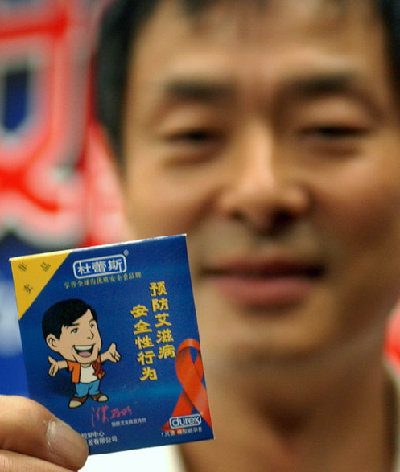Fight will go on despite grant cut
 0 Comment(s)
0 Comment(s) Print
Print E-mail
China Daily, November 1, 2011
E-mail
China Daily, November 1, 2011
China's top health official reiterated that an international charity's decision to not give millions of dollars to Chinese organizations that fight AIDS and other diseases will not bring about the end of those organizations.
 |
|
It is his image as an anti-AIDS figurehead that is the most impressive. In 2000, Pu Cunxin didn't hesitate to accept an appointment by the Health Ministry as a spokesman.[Photo/CFP] |
The Global Fund to Fight AIDS, Tuberculosis and Malaria announced on Monday that it will withhold $95 million from the $270 million in grants it had planned to give China. That decision came as the result of months of discussion between the charity and Chinese officials.
On the mainland, a large number of programs meant to prevent the spread of HIV/AIDS have received money from the Global Fund. Many observers now fear that the announced cut will undermine those organizations' work.
Chen Zhu, the minister of health, said officials have found a way to limit the harm.
"In the coming five years, the Chinese government will constantly increase its financial support of social organizations, particularly those that work to control and prevent HIV/AIDS," Chen said while addressing the 6th Experience Exchange Conference of International Cooperation Program on HIV/AIDS in China on Monday.
In a recent survey of more than 200 organizations taking part in the fight against HIV/AIDS on the mainland, nearly 80 percent of the respondents said they had received grants from the Global Fund.
About 83 percent of them said they will find it difficult to continue operating without financial support from abroad, it said.
Official statistics showed the Global Fund has given China $548 million in grants since 2003.
Xia Jing, leader of a Beijing-based grassroots organization dedicated to controlling AIDS, said: "We were like children fostered by foreign milk. As foreign money began to be withdrawn from China, we were faced with serious financial hardships."
Han Mengjie, executive director of Global Fund China Programs, said the Chinese government has fully recognized the important role social organizations play in controlling diseases.
"The work done and efforts made by such organizations must be sustained for a long time to supplement the government's intervention work," he said.
"We have to face the truth that international money for AIDS control will gradually leave China and to prepare ourselves to deal with that."
He said the announced cut will affect some intervention programs, although at least 80 percent of China's money for AIDS control has come from the government.
He said officials will make adjustments to compensate for the cut.
"The efforts in the future will be more targeted to make the best use of resources."
The government will further draw on potential resources and diversify them, Han said.
In another response to the cut, the government-backed Chinese Association of STD/AIDS Prevention and Control and the health care company Abbott signed a memorandum of understanding to start a three-year program to fight AIDS.
Statistics from the ministry showed that, by the end of September, China had reported 429,000 cases of HIV infection on the mainland, including 164,000 cases in which patients had developed AIDS.





